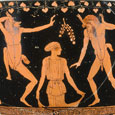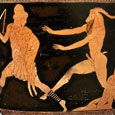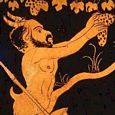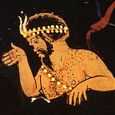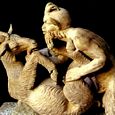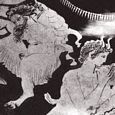PANES
Greek Name
Παν Πανες
Transliteration
Pan, Panes
Roman Name
Faunus, Fauni
Translation
All (pan), Rustic
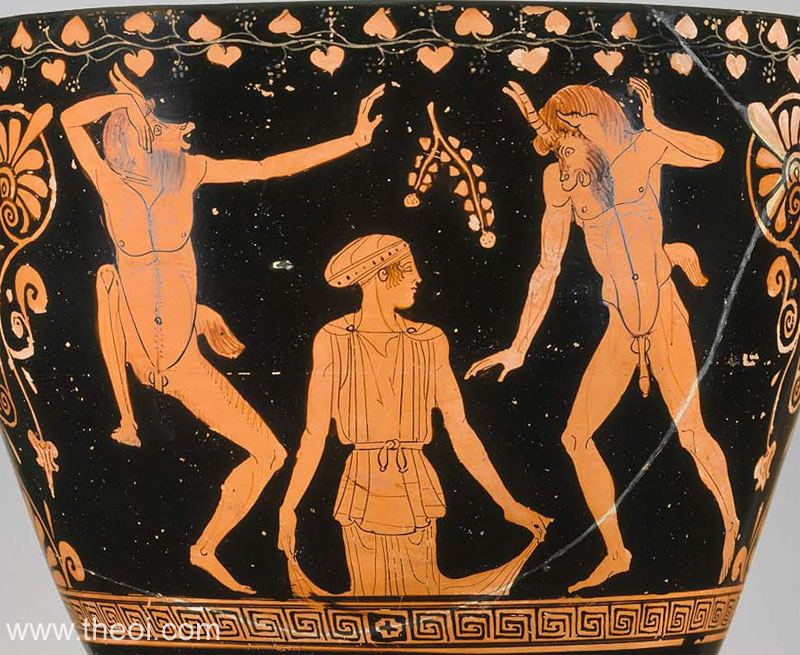
THE PANES were rustic spirits (daimones) of the mountains and highland pastures who protected the goat herds and sheep flocks which grazed these lands.
Panes were depicted as goat-footed men with the horns, tail, beard, snub nose and ears of a goat. They sometimes had actual goat-heads instead of just a few goatish features. As lascivious fertility spirits they were often depicted with erect members.
The Panes were a multiplication of the Arkadian god Pan. They were closely connected with the Satyroi (Satyrs), creatures which had asinine tails and ears in contrast to the goatish features of the Pan.
FAMILY OF THE PANES
PARENTS
Some were sons of HERMES, of ZEUS, & of the prime PAN
LIST OF NAMED PANES
AIGIPAN (Aegipan) A Pan who helped Zeus in his battles with the monster Typhoeus. He was placed amongst the stars as the Constellation Capricorn.
AGREUS A Pan demigod of hunting and rustic prophecy.
NOMIOS (Nomius) A Pan demigod of shepherds and pastures.
PAN The elder Pan, a god of shepherds, hunting, rustic music and prophecy.
PANEIDES The twelve sons of the primal Pan.
PAN SYBARIOS An Italian Pan born of a shepherd who had coupled with a goat.
PHAUNOS (Faunus) The goat-footed Italian god of flocks.
CLASSICAL LITERATURE QUOTES
PANES THE RUSTIC SPIRITS
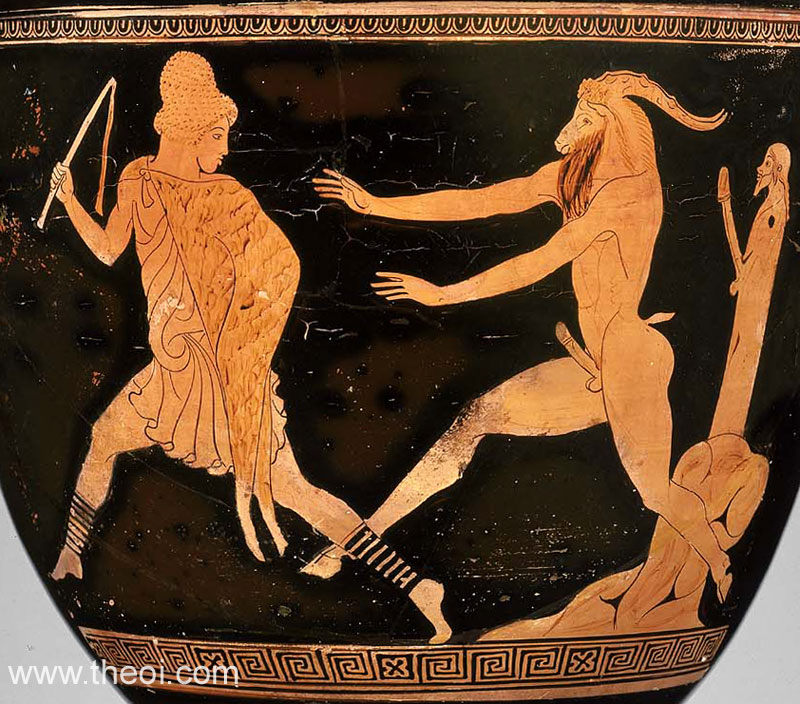
Strabo, Geography 10. 3. 15 (trans. Jones) (Greek geographer C1st B.C. to C1st A.D.) :
"[Rustic spirits :] Kabeiroi (Cabeiri) and Korybantes (Corybantes) and Panes and Satyroi (Satyrs) and Tityroi."
Pausanias, Description of Greece 8. 37. 1 (trans. Jones) (Greek travelogue C2nd A.D.) :
"The sacred enclosure of Despoine [near Akakesion (Acacesium) in Arkadia (Arcadia)]. As you go to the temple there is a portico on the right, with reliefs of white marble on the wall . . . On the third relief are Nymphai (Nymphs) and Panes."
Ovid, Metamorphoses 1. 192 ff (trans. Melville) (Roman epic C1st B.C. to C1st A.D.) :
"I [Zeus] have my Demigods (semidei), my Fauni [Panes] and Satyri (Satyrs), my Nymphae (Nymphs) and Rustic Sprites (numina rustica) of wold and wood, not worthy yet to win the sky, but sure the earth, their portion, we must prove secure."
Ovid, Metamorphoses 6. 392 ff :
"[After the death of the Satyrus Marsyas :] The countryfolk, the Sylvan Deities (Numina Silvarum), the Fauni [Panes] and brother Satyri (Satyrs) and the Nymphae (Nymphs), were all in tears, Olympus too."
Ovid, Metamorphoses 14. 634 ff :
"For fear of rustic force she [the Latin Hamadryas Pomona] walled her orchard in to keep away the sex she shunned. What tricks did they not try, the quick young light-foot Satyri (Satyrs), and the Panes who wreathe their horns with pine . . . what did they all not try to win her love?"
Ovid, Heroides 4. 47 ff (trans. Showerman) (Roman poetry C1st B.C. to C1st A.D.) :
"I am borne on, like daughters of the Bacchic cry driven by the frenzy of their god [Dionysos], and those who shake the timbrel at the foot of Ida's ridge [i.e. the Korybantes (Corybantes)], or those whom Dryades half-divine and Fauni two-horned (bicornes) [Panes] have touched with their own spirit and driven distraught."
Ovid, Heroides 4. 169 ff :
"May the agile goddess [Artemis] wait on you [the hunter Hippolytos] in the solitary glade to keep you safe, and the deep forest yield you wild beasts to slay; so may the Satyri be your friends, and the mountain deities (numina montanum), the Panes, and may the boar fall pierced in full front by your spear; so may the Nymphae (Nymphs) . . . give you the flowing water to relieve your parching thirst!"
Cicero, De Natura Deorum 3. 17 (trans. Rackham) (Roman rhetorician C1st B.C.) :
"If gods exist, are Nymphae (Nymphs) also goddesses? If the Nymphae are, the Panes and Satyri (Satyrs) also are gods; but they are not gods; therefore the Nymphae also are not."
Statius, Silvae 2. 2. 102 ff (trans. Mozley) (Roman poetry C1st A.D.) :
"Often in autumn-time when the grapes are ripening, a Nereis (Nereid) climbs the rocks, and under cover of the shades of night brushes the sea-water from her eyes with a leafy vine-spray, and snatches sweet clusters from the hills. Often is the vintage sprinkled by the neighbouring foam; Satyri (Satyrs) plunge into the waters, and Panes from the mountain are fain to grasp the Sea-Nympha as she flies naked through the waves."
Apuleius, The Golden Ass 6. 24 ff (trans. Walsh) (Roman novel C2nd A.D.) :
"[At the wedding of Cupid (Eros) and Psyche :] She [Aphrodite] had organized the performance so that the Musae (Muses) sang in chorus, a Satyrus played the flute, and a Paniscus [a Pan] sang to the shepherd's pipes."
PANES ATTENDANTS OF DIONYSUS & RHEA
Strabo, Geography 10. 3. 15 (trans. Jones) (Greek geographer C1st B.C. to C1st A.D.) :
"They [the poets] also invented some of the names by which to designate the ministers, choral dancers, and attendants upon the sacred rites [of Rhea and Dionysos], I mean Kabeiroi (Cabeiri) and Korybantes (Corybantes) and Panes and Satyroi (Satyrs) and Tityroi."
Philostratus the Elder, Imagines 1. 19 (trans. Fairbanks) (Greek rhetorician C3rd A.D.) :
"[From a description of an ancient Greek painting depicting Dionysos and the pirates :] A mission ship and a pirate's ship. Dionysos steers the former, on board the latter are Tyrrhenians, pirates who ravage their own sea . . He [Dionysos] is accompanied only by Lydian women and Satyroi and fluteplayers, and an aged narthex-bearer, and Maronian wine, and by Maron himself. Hearing that Panes sail with him in the form of goats, they [the pirates] planned to carry off the Bakkhai (Bacchae) for themselves and to turn over to the Panes she-goats, such as are raised in the land of the Tyrrhenians."
Ovid, Fasti 1. 391 ff (trans.Boyle) (Roman poetry C1st B.C. to C1st A.D.) :
"You were holding, Greece, the feast of grape-crowned Bacchus [Dionysos], celebrated by custom each third winter. The gods who serve Lyaeus [Dionysos] also attended and whoever is not hostile to play, namely Panes and young Satyri (Satyrs) and goddesses who haunt streams [Naiades] and lonely wilds [and also Seilenos and Priapos] . . . They discovered a grove suitable for party pleasures and sprawled on grass-lined couches. Liber [Dionysos] supplied wine, they had brought their own garlands, a brook gave water for frugal mixing."
Propertius, Elegies 3. 17 (trans. Goold) (Roman elegy C1st B.C.) :
"Dircean Thebes will beat the wanton tambourine [in the worship of Dionysos], and goat-foot Panes will play on pipes of reed."
Seneca, Phaedra 783 ff (trans. Miller) (Roman tragedy C1st A.D.) :
"For thy slumbers the frolicsome goddesses of the groves will lay their snares, the Dryades, who pursue Panes wandering on the mountains."
Nonnus, Dionysiaca 9. 200 ff (trans. Rouse) (Greek epic C5th A.D.) :
"Thus he [Dionysos] grew up beside cliffloving Rheia [in the mountains of Phrygia], yet a boy in healthy youth, mountainbred. Circles of Panes among the rocks came about the dancebeating son of Thyone, skipping around the crags on shaggy-knee legs and crying ‘Euoi!’ to Bakkhos (Bacchus); and the goatfoot hooves rattled in their capers, as they went round and round in the dance."
Nonnus, Dionysiaca 11. 113 ff :
"The Panes have their cithern and their melodious tootling pipes [as gifts from Dionysos]; the Satyroi (Satyrs) have the roundrattling tomtom from your patron Dionysos; even the mountainranging Bassarides ride on the backs of lions."
Suidas s.v. Backhai (trans. Suda On Line) (Byzantine Greek lexicon C10th A.D.) :
"Bakkhai (Bacchae) : [Bacchantes] and Satyroi (Satyrs) and Panes and Silenoi (Silens), attendants of Dionysos."
THE PANES & THE INDIAN WAR OF DIONYSUS
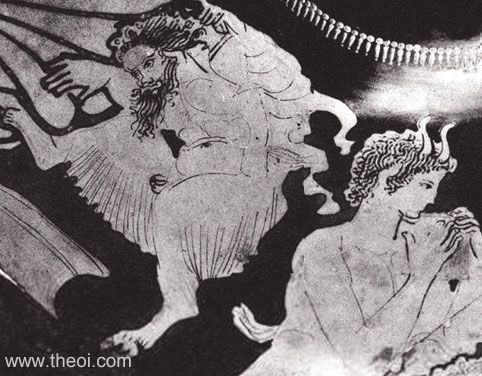
Philostratus, Life of Apollonius of Tyana 3. 13 (trans. Conybeare) (Greek biography C1st to C2nd A.D.) :
"Now [in India] the hill the summit of which is inhabited by the sages is, according to the account of our travellers, of about the same height as the Akropolis (Acropolis) of Athens; and it rises : straight up from the plain, though its natural position equally secures it from attack for the rock surrounds it on all sides. On many parts of this rock you see traces of cloven feet and outlines of beards and of faces, and here and there impressions of backs as of persons who had slipt--and rolled down. For they say that Dionysos, when he was trying to storm the place together with Herakles, ordered the Panes to attack it, thinking that they would be strong enough to take it by assault; but they were thunderstruck by the sages and fell one, one way, and another, another; and the rocks as it were took the print of the various postures in which they fell and failed."
Nonnus, Dionysiaca 14. 67 ff (trans. Rouse) (Greek epic C5th A.D.) :
"[Rheia summons the rustic spirits to the army Dionysos for a campaign against the Indians :] The rockdwellers [Panes] came also from their self-vaulted caves, bearing all the name of Pan their father the ranger of the wilderness, all armed to join the host; they have human form, and a shaggy goat's head upon it with horns. Twelve horned Panes there were, with this changeling shape and hornbearing head, who were begotten of the one ancestral Pan their mountainranging father. One they named Kelaineus (Blackie) as his looks bore witness, and one Argennos (Whitey) after his colour; Aigikoros (Goatgluts) was well dubbed, because he glutted himself with goat's-milk which he pressed from nannies udders in the flock. Another masterly Pan was called Eugeneios (Longbeard), from a throat and chin which was a thick meadow of hair. Daphoineus (the Bloody) came along with Omester (Eat-em-raw); Phobos (the Fright-away) with shaggy-legged Philamnos (the Lamb's Friend). Glaukos with Xanthos, Glaukos glaring like the bright sea, with a complexion to match. Xanthos had a mane of hair like a bayard, which gave that name to the horned frequenter of the rocks. Then there was bold Argos with a shock of hair as white as snow . . . Along with these came Phorbas (Fear) to join their march, savage and insatiate."
Nonnus, Dionysiaca 17. 136 ff :
"[During Dionysos' war against the Indians :] The Panes madly made battle skipping with light foot over the peaks. One of them gript and enemy's neck tight with encircling hands, and ript him with his goat's-hooves, tearing through the flank and strong corselet together. Another caught a fugitive Indian and ran him through this middle where he stood, then lifting him on the curved points of his two longbranching antlers, sent him flying high through the airy ways, rolling over himself like a tumbler. Another waved in his hand the strawcutting sickle of sheafbearing Deo [Demeter], and reaped the enemy crops with clawcurved blade, like cornears of conflict, like gavels of the battlefield. There was a revel for Ares [i.e. War], there was harvest-home for Dionysos, when the enemy's heads were cut! He offered the curved blade to watching Bakkhos (Bacchus), dabbled with human dew, and so poured a blood-libation to Dionysos, and made the Moirai (Fates) drunken with the battlecup he filled for them. Another man was standing, when one goatfoot Pan twined both hands interlacing about his neck, and struck his wellcorseted emeny with his horn, tearing his flank with the double point. Another met a fellow rushing on him with a blow from his cudgel, and smashed his forehead right between the ends of his eyebrows."
Nonnus, Dionsyiaca 18. 48 ff :
"The Panes [in Dionysos' army], high on their familiar rocks, danced in the dust with nimble feet, passing over the headlands of those untrodden precipices."
Nonnus, Dionysiaca 21. 178 ff :
"[When the god Dionysos was driven into the sea by Lykourgos (Lycurgus) :] The Satyros (Satyr) so full of energy showed a face unsmiling, and languished in sorrow strange to him. The Panes wandered wild through the woods with hillranging hoof, Panes in search of Dionysos, and heard no word of him . . . So they [the companions of Dionysos] were all restless and sad."
Nonnus, Dionysiaca 22. 39 ff :
"The Panes then, roaming about the craggy ravines sped on nimble hooves through the trackless hills; in terrible places, where even that light traveller the bird would not dare to fly, or traverse with his pair of beating wings in his lofty course."
Nonnus, Dionysiaca 23. 155 ff :
"[The Indian river Hydaspes tries to drown the troops of Dionysos as they cross his stream :] He curved his own stream, and leapt upon Bakkhos (Bacchus) with a volley of foaming surf . . . The syrinx of Pan was floating on the surface and rolling of itself on the waves, tossed about beside the double pipes."
Nonnus, Dionysiaca 24. 35 ff :
"Spare my reeds [set on fire], which . . . spare the harmonious tune of the pan-pipes [of the Panes] which guides your [Dionysos's] own mystic song!"
Nonnus, Dionsyiaca 24. 100 ff :
"The Satyroi (Satyrs) attended his [Dionysos's] passage, and with them Bakkhante (Bacchante) women and Panes passed through the water."
Nonnus, Dionysiaca 24. 123 ff :
"They [the Panes, Satyroi (Satyrs) and Bakkhantes (Bacchantes)] leapt about dancing on the Indian drags, along the rocky paths; then they built shelters undisturbed in the dark forest, and spent the night among the trees. Some went deerhunting with dogs after the long-antlered stags."
Nonnus, Dionysiaca 27. 25 ff :
"[Deriades addresses his Indian troops :] ‘Kill me those Panes also with devastating steel. Or if they are gods, and it is not permitted to pierce the body of unwounded Pan with cutting steel, then I make prey of the mountainranging Panes, and they shall tend herds of elephants in the wilderness. Thee are plenty of wild beasts here also, with which I will join the wildbeast Kentauroi (Centaurs) and Panes of hillranging Dionysos; or I will make them a swarm of attendants for my daughter, and waiters upon the festal table of Morrheus.’"
Nonnus, Dionysiaca 29. 313 ff :
"[During the Indian War of Dionysos :] A friendly Pan fought with his goatsfeet: with a sharp stroke of his pointed hoof he tore all down the hollow flank of [the Indian] archer Melaneus and laid open his belly."
Nonnus, Dionysiaca 34. 128 ff :
"[Dionysos is driven mad by Hera and absents the war, demoralising the army :] The Panes had drunk no hot blood fresh from the veins of a lioness of the wilds, and rushed not swift as the wind frenzied into the conflict, but they were mild with fear: hesitating they pawed the ground with gentle noiseless hooves, and ceased the terrible leaps of their highland dance."
Nonnus, Dionysiaca 37. 10 ff :
"[During the Indian War of Dionysos :] When Dionysos saw friendly calm instead of war, early in the morning he sent out mules and their attendant men to bring dry wood from the mountains, that he might burn with fire the dead body of Opheltes. Their leader into the forest of pines was Phaunos (Faunus) who was well practised in the secrets of the lonely thickets which he knew so well, for he had learnt about the highland haunts of Kirke (Circe) his mother. The woodman's ace cut down the trees in long rows. Many an elm was felled by the long edge of the axe, many an oak with leaves waving high struck down with a crash, many a pine lay all along, many a fir stooped its dry needles; as the trees were felled far and wide, little by little the rocks were bared. So many a Hamadryas Nymphe (Hamadryad Nymph) sought another home, and swiftly joined the unfamiliar maids of the brooks.
Parties coming up would often meet, men on the hills traversing different mountain-paths. One saw them up aloft, out in front, coming down, crossing over, with feet wandering in all directions. The sticks were packed in bundles with ropes well twisted and fastened tight and trim, and laid on the mules' backs; the animals set out in lines, and the hooves rang on the mountain-paths as they hurried along, the surface of the sandy dust was burdened by heavy logs dragged behind. Satyroi (Satyrs) and Panes were busy; some cut wood with axes, some pulled it from tree after tree with their hands, or lifted trunks with untiring arms and rattled over the rocks with dancing feet."
Nonnus, Dionysiaca 38. 1 ff :
"The people retired into the recesses of the forest, and entered their huts. The rustic Panes housed themselves under shelter in the ravines, for they occupied at evening time the natural caverns of a lioness in the wilds. The Satyroi (Satyrs) dived into a bear's cave, and hollowed their little bed in the rock with sharp finger-nails in place of cutting steel; until the light-brining morning shone, and the brightness of Eos (the Dawn) newly risen showed itself peacefully to both Indians and Satyroi."
ANCIENT GREEK & ROMAN ART
SOURCES
GREEK
- Strabo, Geography - Greek Geography C1st B.C. - C1st A.D.
- Pausanias, Description of Greece - Greek Travelogue C2nd A.D.
- Aelian, On Animals - Greek Natural History C2nd - 3rd A.D.
- Philostratus the Elder, Imagines - Greek Rhetoric C3rd A.D.
- Philostratus, Life of Apollonius of Tyana - Greek Biography C2nd A.D.
- Nonnus, Dionysiaca - Greek Epic C5th A.D.
ROMAN
- Ovid, Metamorphoses - Latin Epic C1st B.C. - C1st A.D.
- Ovid, Fasti - Latin Poetry C1st B.C. - C1st A.D.
- Ovid, Heroides - Latin Poetry C1st B.C. - C1st A.D.
- Propertius, Elegies - Latin Elegy C1st B.C.
- Cicero, De Natura Deorum - Latin Rhetoric C1st B.C.
- Seneca, Phaedra - Latin Tragedy C1st A.D.
- Apuleius, The Golden Ass - Latin Novel C2nd A.D.
BYZANTINE
- Suidas, The Suda - Byzantine Greek Lexicon C10th A.D.
BIBLIOGRAPHY
A complete bibliography of the translations quoted on this page.
